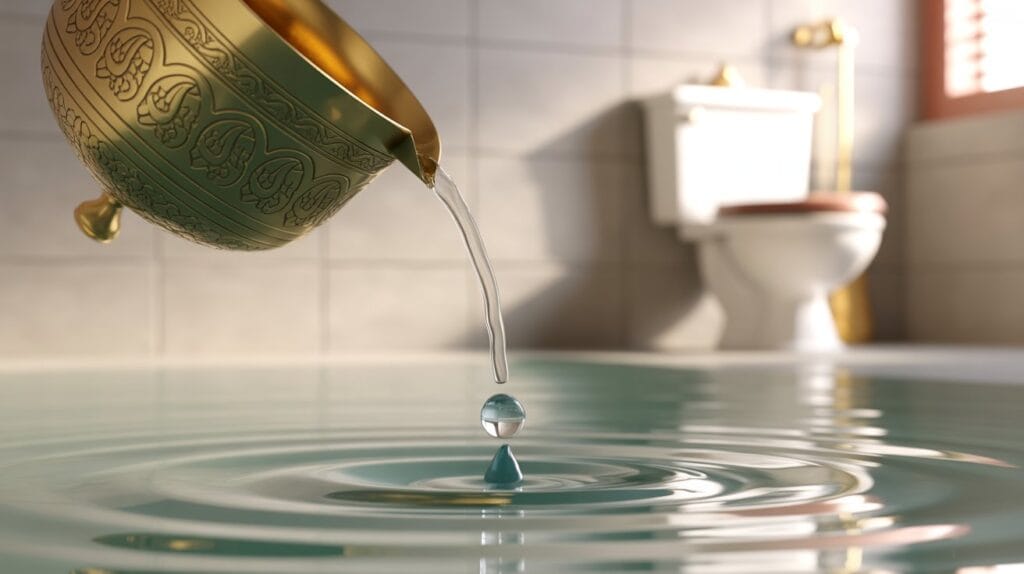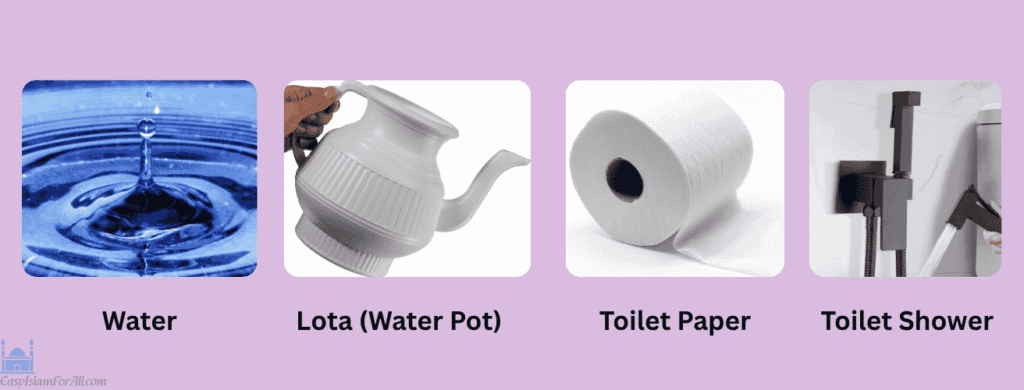Islamic Toilet Etiquette & Bathroom Duas: A Complete Guide

Introduction: What is Islamic Toilet Etiquette?
Islamic toilet etiquette is the Muslim way of staying clean after using the bathroom. This practice, called Istinja, means to wash with water.
It is a key part of Taharah (purity) in Islam. Taharah is not just being physically clean. It is a spiritual cleanliness required for your Salah (prayer) and for touching the Quran.
Following this Islamic toilet etiquette was taught by the Prophet Muhammad (PBUH). It is an act of worship and obedience to Allah. It also keeps you healthy and fresh.
The Importance & Benefits of Istinja in Islam
Istinja is very important in Islam. It is the first step to make Wudu (ablution). Without Wudu, your Salah (prayer) is not accepted by Allah.
The Prophet Muhammad (PBUH) warned us to be very careful about urine. He said that being careless is a major sin. This shows how serious Islamic purity is.
This practice also has many health benefits. Doctors say washing with water helps prevent infections. It keeps your skin clean and free from germs. So, Istinja is good for your body and your soul.
How to Perform Istinja: Complete Step-by-Step Guide
Performing Istinja is easy. You can do it in two ways: with water or with toilet paper. Water is the best and cleanest way.
What You'll Need for Istinja

- Water: This is the best thing to use. It cleans perfectly.
A Lota: This is a small pot with a handle. It helps you pour water with one hand. You can also use a water bottle or a bidet.
Toilet Paper: This is useful for drying after washing with water. You can also use it alone if you cannot find water.
Muslim Shower: A Water line of flexible pipe with a sprayer nozzle at the end.
These simple things help you follow the Islamic toilet etiquette correctly.
Step 1: Before You Enter
Enter the bathroom with your left foot first.
Do not face the Qibla (the direction of the Kaaba in Mecca) when you relieve yourself.
Say the dua for entering the bathroom in your heart.
Step 2: While You Are There
Be careful. Do not let urine splash on your body or clothes.
Sit down if you can. It is cleaner and safer.
Do not talk or say “Bismillah” inside.
Step 3: How to Clean (Istinja)
Method 1: Performing Istinja with Water
This is the best way. It makes you the cleanest. After urinating
Get Ready: Have your lota or water bottle close to you.
Use Your Left Hand: Hold the lota with your left hand.
Pour and Wash: Pour water over the private area. Use your fingers to clean gently. Make sure water reaches everywhere.
Check: Keep washing until all dirt is gone. The skin should feel clean.
Dry: Pat the area dry with clean toilet paper.
This method with water makes sure you are pure for prayer.
Method 2: Performing Istinja with Toilet Paper
Use this way only if you cannot find water.
Use Odd Numbers: Take 3, 5, or 7 pieces of toilet paper.
Wipe Carefully: Wipe the private area until the paper looks completely clean.
Check: Make sure the skin is dry. No wetness should be left.
This is a good way to clean when water is not there. But when you find water, you should wash with it to be fully clean.
Which Method is Better?
Water is the better way. It is the Sunnah method taught by the Prophet Muhammad (PBUH).
Here is why:
Water cleans better: It washes away all traces of dirt that paper cannot remove.
It is healthier: Water helps stop germs that can cause infections.
It feels cleaner: It leaves you feeling fresh and pure.
Using toilet paper is allowed, but it is a second choice. Use it only when you cannot find water. The best practice is to use both: paper first, then water to wash.
Step 4: When You Leave
Wash both your hands with soap and water.
Leave the bathroom with your right foot first.
Say the dua for leaving the bathroom.
Bathroom Duas: What to Say Before Entering and After Leaving
Saying prayers, or Duas, for the bathroom is very important. It protects you and reminds you of Allah.
You say one Dua before you go in and a different Dua after you come out. These are short and easy to remember.
Dua Before Entering the Bathroom
Before you enter, say this in your heart:
In Arabic:
بِسْمِ اللَّهِ، اللَّهُمَّ إِنِّي أَعُوذُ بِكَ مِنَ الْخُبْثِ وَالْخَبَائِثِ
Transliteration (How to say it):
“Bismillahi, Allāhumma innī a`ūdhu bika minal-khubthi wal-khabā’ith“
English Meaning:
“In the name of Allah. O Allah, I seek protection in You from the male and female evil spirits.“
Remember: Do not say Allah’s name out loud inside the bathroom. Say it in your heart before you step in.
Dua After Leaving the Bathroom
After you leave and wash your hands, say this:
In Arabic:
غُفْرَانَكَ
Transliteration (How to say it):
“Ghufrānaka”
English Meaning:
“I seek Your forgiveness.“
This is a simple way to thank Allah for keeping you safe and clean.
Islamic Bathroom Etiquette: Do's, Don'ts & Common Mistakes
Following the right rules in the bathroom is a key part of Islamic toilet etiquette. Here is a simple list of what to do and what not to do.
Do’s (Good Things to Do)
Enter with your left foot first.
Leave with your right foot first.
Be careful to keep your clothes and body clean.
Wash your hands with soap when you finish.
Don’ts (Things to Avoid)
Do not face the Qibla (direction of prayer) when relieving yourself.
Do not speak or answer anyone inside.
Do not take a phone or Quran inside.
Do not waste water.
Common Mistakes to Avoid
Not washing properly. Make sure you are completely clean.
Using the right hand to clean. Always use your left hand.
Using only toilet paper when water is available. Water is better.
Following these rules shows respect for Allah and keeps you pure.
Istinja for Women and During Menstruation
The way to do Istinja is the same for everyone. But women need to be extra careful during their monthly period.
Special Care During Menstruation
When a woman has her period, she must clean herself very well after using the toilet.
Blood is an impurity (najis), so it is very important to wash it all away.
She should use water to make sure she is completely clean, especially in the folds of the skin.
Getting Ready for Prayer Again
When her period ends, she must take a full bath called Ghusl.
The first step of Ghusl is to do Istinja perfectly. This removes all physical impurities.
After a perfect Istinja, she can then wash her whole body for Ghusl and become pure for prayer.
Remember, being clean is for your health and your worship.
Frequently Asked Questions (FAQ)
1. Can Muslims Use Toilet Paper? (And Is Water Mandatory?
2. What if I'm in a public restroom with no water or lota?
3. Why can't we say 'Bismillah' out loud in the bathroom?
4. How do I perform Istinja during menstruation?
5. Do I need to make Wudu after performing Istinja?
6. Can I use wet wipes?
7. What is the proof for using the left hand?
8. What if water splashes back from the toilet onto my clothes?
9. Is it necessary to wash the hands after Istinja even if they didn't get dirty?
10. I have a physical disability that makes it hard to reach. What should I do?
Summary: Key Points to Remember
Here are the most important things to remember about Islamic toilet etiquette:
Istinja means cleaning yourself with water after using the toilet. It is the first step to purity.
Always use your left hand for washing.
Water is the best and cleanest way. Use toilet paper only if water is not there.
Say the bathroom duas before you enter and after you leave.
Do not face the Qibla and do not talk inside.
For women, be extra clean during your monthly period.
Always wash your hands with soap when you finish.
Following these simple rules keeps you clean, healthy, and pure for your prayers.